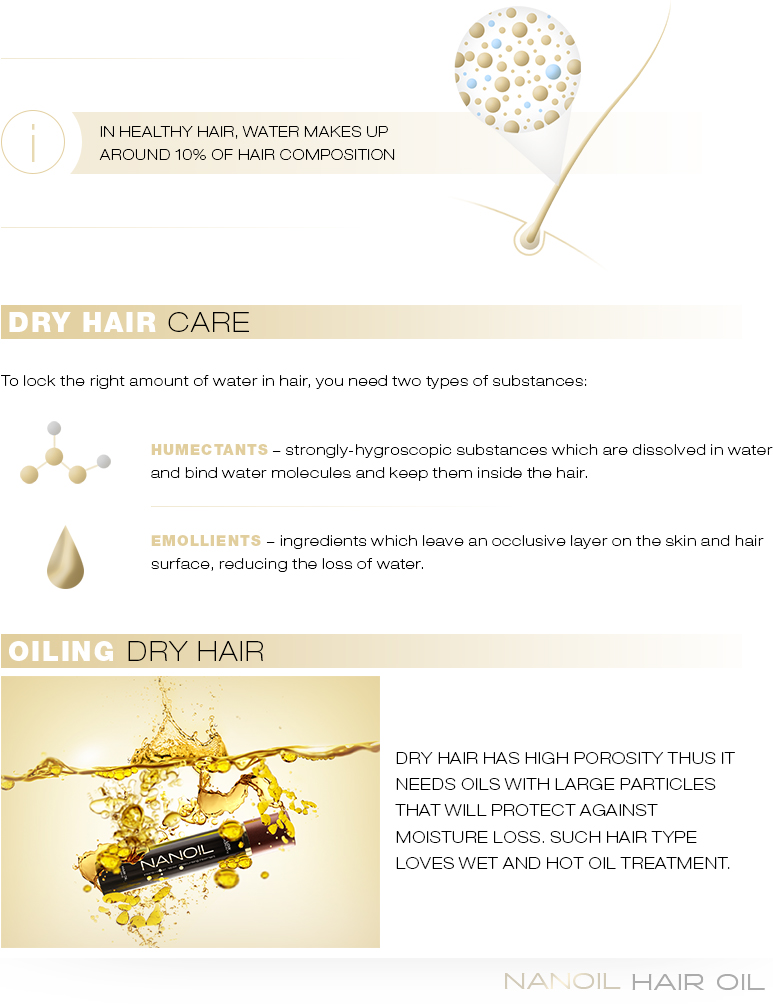- NANOIL Products
- Oils
- Face serums
- Hair masks
- Shampoos
- Hair conditioners
- Hair styling
- Care
- Hair Porosity Test
- Blog
- Contact

If your hair is dull, hard to detangle and lacks elasticity, it’s probably very dry, too. It doesn’t mean your hairdo is damaged. It’s time to dispel lots of myths. Find out what very dry hair really needs.
Hydration is the core of hair (and skin) care. Water is the source of life and beauty. Before moving on to how to moisturise dry hair, we should take a closer look at its characteristics and needs.
Women often ask themselves – why is my hair dry? To be honest, it’s a global problem. It’s hard to find hair which is non-stop hydrated. Without water, strands lose what’s most valuable. That’s why the word ‘dry’ often goes with other adjectives: dry and damaged hair, dry and stiff hair, dry and thinning hair, dry and dull hair, dry and brittle hair, etc. The list is endless. There’s one thing the problems have in common – too little water inside the hair is always to be blamed.

In healthy hair, water makes up around 10% of hair composition. You should keep this minimum hydration level because it’s essential for keeping the right condition of both external and internal hair structure. Water is partly responsible for e.g hair bounce. That is why very dry hair (with a low water content) is a big problem.
Excessive water loss in hair usually results from too little sebum (produced by sebaceous glands on the scalp). A slight layer of fat surrounding the hair stem plays a key role – it isolates from the harmful factors and – most of all – prevents the loss of water. Disturbed lipid coat or striping it off leads to faster evaporation of water. That’s how you get dry hair.
The deficit of ceramides – in the corneum – may also make hair dry. These chemical compounds make up the non-porous coat which locks water in the scalp. At the same time, it ensures elasticity and keeps the right temperature. If ceramides are weak because we don’t deliver the right amount of UFA (unsaturated fatty acids), we struggle with hair dryness.
There are two other key aspects:
1. The level of hair and scalp hydration keeps changing, which depends on lots of factors, including seasons. Very dry hair is far more common in winter (when the temp drops, the air moisture outside and the air dryness inside increase) or summer (due to the harmful sunlight and higher temps).
2. Some people have naturally dry hair. What does it mean? In this situation, strands are dry naturally because the skin fails to deliver the protective amount of sebum. In this case, dry hair doesn’t equal damage. Dry hair isn’t always damaged! Obviously, it’s not alright. Naturally dry hair is usually curly and needs moisture-increasing care, too.
Let’s move on to the key question – how to moisturize dry hair. The case isn’t as simple as it seems. There’s a common doubt ‘my hair has a non-stop contact with water so why it’s dry’. Delivering water won’t help because it quickly evaporates and leaves strands even drier.
To lock the right amount of water in hair, you need two types of substances:
Dry hair care should be based on providing the balance of emollients and humectants, not exclusively water. That’s the only way to bring hair vitality and beautiful appearance back.
1. Intensively-hydrating products. It’s logic that extremely dry hair needs moisture above everything. That’s why you must choose humectant-rich products. The most popular humectants in cosmetics include hyaluronic acid, honey, aloe, flaxseed, panthenol (pro-vitamin B5), glycerin, maple syrup, urea and sodium lactate. The best mask for dry hair contains at least one of the mentioned substances on top of the list of ingredients.
2. Natural emollient products. If you deliver the right amount of water, you must lock it in. Go for emollient masks or natural oils. What to search for in products? Silicones, paraffin, vegetable oils and butters are most common emollients. First two groups aren’t natural so they may leave hair heavier and damaged in the long run. Natural ingredients – like oils e.g. argan oil, olive oil or avocado oil – make a much better choice.
Must-know! Dry hair doesn’t like proteins. Masks and conditioners with proteins (keratin, silk, collagen, wheat or egg) work only when you wonder how to regenerate dry hair – when strands are both dry and damaged.
What’s a dry hair fix? Mostly, natural oils which don’t just prevent the loss of hydration and protect against harmful factors but also nourish, reinforce and give a stunning appearance. The best oils for dry hair are the oils designed for high porosity hair (the type that loses water due to highly-raised cuticle scales). Still, it’s not the rule. As I’ve mentioned earlier, hair dryness doesn’t mean hair damage.
The way you apply an oil to hair matters hugely. Hot oil treatment is the best for dry hair. Also, apply the oil to wet strands because both water and heat enhance the absorption of valuable nutrients.
Cleaning stage is as important as the choice of suitable products. Even the best-matching products fail if you don’t know how to wash dry hair. A few things matter.
Is there anything more that helps dry hair? Go for at-home dry hair remedies because they usually give great results. I don’t mean using DIY masks instead of professional treatments and moisturising oils. Home masks should work as additives. How to hydrate dry hair? Which ingredients to choose?
1. DIY dry hair mask is a good variation if it’s infused with oils and humectants. Use olive oil or a different light oil as a base. After mixing it with honey or aloe juice, you get a mask that your dry hair is going to like. Let it sit in for fifteen minutes and rinse out. Apply the mask e.g. once a week.
2. Dry hair likes acidic mixtures. For final rinsing, use water mixed with apple cider vinegar, hibiscus, lemon or other citruses. Doing so, you seal cuticle scales, locking water in and enjoying silky smooth strands.
Comments: #0